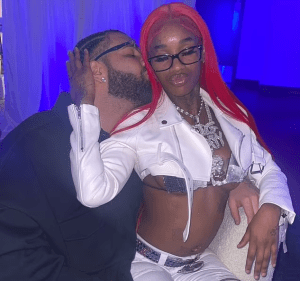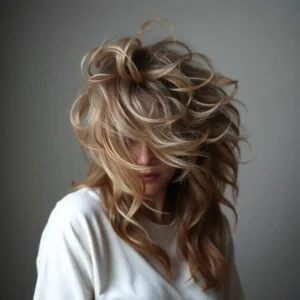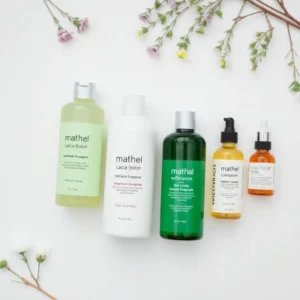Ever wonder why your hair isn’t as shiny, full, or strong as you’d like it to be? The secret lies beneath the surface—literally. A healthy scalp is the foundation for gorgeous hair, yet it’s often overlooked in our beauty routines.
Think of your scalp as the soil for your hair’s growth. If it’s neglected, it can lead to problems like dandruff, oiliness, or even hair loss. But don’t worry! Scalp care doesn’t have to be complicated. With the right tips and products, you can transform your scalp health and, in turn, your hair.
In this guide, we’ll explore why scalp care is crucial, common scalp issues and their causes, and practical steps to nurture your scalp for stronger, healthier hair. Let’s get started!
Why Scalp Health Matters
Your scalp isn’t just skin; it’s a dynamic part of your body that directly impacts your hair’s health and growth. Here’s why giving it the attention it deserves is so important:
1. Supports Healthy Hair Growth
Hair grows from follicles located in the scalp. A clean, nourished scalp creates the ideal environment for these follicles to function optimally, producing thicker, stronger hair strands.
2. Reduces Hair Loss and Breakage
Scalp issues like clogged follicles or excessive dryness can weaken the hair at its root, leading to shedding and breakage. By caring for your scalp, you’re strengthening your hair from the ground up.
3. Prevents Common Hair Concerns
A healthy scalp helps prevent or minimize issues like dandruff, itchiness, and an oily scalp. When your scalp is in balance, your hair naturally looks and feels better.
4. Boosts Confidence
Let’s be real—scalp problems like flakes or greasy roots can be embarrassing. Proper scalp care not only enhances hair health but also gives you the confidence to flaunt your locks.
Taking care of your scalp is like tending to a garden. Water it, nourish it, and watch your hair thrive!
Common Scalp Issues and Their Causes
Many people deal with scalp problems without understanding what’s causing them. Here are the most common concerns and their triggers:
Dandruff and Flakiness
Dandruff occurs when the scalp’s natural balance is disrupted. Causes include:
- Fungal overgrowth (like Malassezia).
- Dryness due to cold weather or harsh shampoos.
- Product buildup from heavy styling products.
Solution: Use an anti-dandruff shampoo with ingredients like zinc pyrithione, tea tree oil, or salicylic acid.
Oily Scalp
An oily scalp happens when the sebaceous glands produce excess oil. This can lead to greasy roots and clogged follicles. Causes include:
- Hormonal fluctuations.
- Over-washing, which triggers the scalp to produce more oil.
Solution: Opt for clarifying shampoos and avoid washing your hair daily unless necessary.
Dry and Itchy Scalp
Dryness can make your scalp feel tight, itchy, or flaky. Triggers include:
- Weather changes (cold, dry air).
- Using shampoos with sulfates or alcohol.
- Dehydration or lack of moisturizing products.
Solution: Incorporate hydrating products with ingredients like aloe vera or glycerin.
Scalp Acne and Irritation
Blocked pores on the scalp can cause pimples and redness. This is often due to:
- Product buildup.
- Poor scalp hygiene.
- Sweat not being washed away after workouts.
Solution: Regular cleansing and exfoliation can prevent and treat scalp acne.
Essential Scalp Care Tips
The key to scalp care is consistency. Here’s how to create a routine that nurtures your scalp and promotes healthy hair:
Cleanse Regularly
A clean scalp is a healthy scalp! Washing your hair removes dirt, oil, and buildup, preventing clogged follicles.
- For oily scalps: Wash every 1–2 days with a gentle, clarifying shampoo.
- For dry scalps: Limit washing to 2–3 times a week and use a moisturizing shampoo.
- For normal scalps: Stick to washing every 2–3 days to maintain balance.
Choose shampoos without harsh sulfates, which can strip your scalp of natural oils.
Exfoliate Your Scalp
Just like your face, your scalp needs exfoliation to remove dead skin cells and encourage blood circulation.
- Use a scalp scrub with ingredients like sugar or sea salt once a week.
- For DIY lovers, mix sugar and coconut oil for a natural scrub.
- Massage gently to avoid irritation.
Exfoliation leaves your scalp feeling refreshed and helps other products work better.
Hydrate and Moisturize
Hydration is crucial for maintaining a comfortable, flake-free scalp.
- Use leave-in treatments or oils with ingredients like aloe vera, glycerin, or hyaluronic acid.
- Avoid heavy products that can clog pores.
Apply moisturizing treatments sparingly to avoid greasy roots.
Massage for Circulation
Scalp massages aren’t just relaxing—they also stimulate blood flow, which nourishes hair follicles.
- Use your fingers or a scalp massager to gently rub in circular motions.
- Enhance the experience by adding a few drops of essential oils like peppermint (to stimulate) or rosemary (to nourish).
Massaging for just 5–10 minutes a day can make a noticeable difference over time.
Best Products for Scalp Care
The right products can make or break your scalp care routine. Here are some top picks based on common scalp needs:
- For Dandruff: Look for shampoos with zinc pyrithione or ketoconazole to fight flakes.
- For Oily Scalp: Try a charcoal-infused shampoo to detoxify and absorb excess oil.
- For Dry Scalp: Use products with argan oil, shea butter, or aloe vera for hydration.
- For Sensitive Scalp: Opt for fragrance-free and hypoallergenic shampoos.
Remember, a patch test is always a good idea when trying new products!
Lifestyle Tips for a Healthy Scalp
Your lifestyle habits can greatly affect your scalp health. Here’s how to support it from the inside out:
Eat a Balanced Diet
- Include omega-3 fatty acids (found in fish and nuts) for hydration.
- Vitamins like Biotin, Zinc, and Vitamin E promote scalp and hair health.
Stay Hydrated
- Drink plenty of water to keep your scalp from drying out.
Manage Stress
- Stress can trigger dandruff or hair loss. Practice relaxation techniques like yoga or meditation.
Avoid Harsh Treatments
- Limit the use of heat tools and chemical treatments, which can damage the scalp.
FAQ Section
1. How often should I exfoliate my scalp?
Once a week is enough for most people. Over-exfoliating can lead to irritation.
2. Can I use face products on my scalp?
It’s not recommended. Scalp skin has different needs than facial skin, so stick to products designed for hair.
3. What’s the best way to treat an oily scalp without over-drying?
Use a balancing shampoo and avoid washing too frequently. Incorporate lightweight, non-greasy hydrating products.
4. Do scalp massages really help with hair growth?
Yes, by increasing blood flow to the follicles, scalp massages can encourage hair growth over time.
5. Are natural remedies effective for scalp care?
Yes! Ingredients like aloe vera, tea tree oil, and coconut oil can address various concerns when used correctly.
Conclusion
A healthy scalp is the key to beautiful, vibrant hair. By cleansing, hydrating, and nourishing your scalp, you can prevent common issues and support optimal hair growth. Remember, scalp care isn’t a one-time effort—it’s a routine that pays off with consistent practice.
Ready to give your scalp the care it deserves? Start today and notice the difference in your hair health! For more expert tips, check out related articles on Tempt Beauty and share your favorite scalp care tips in the comments below.







